Views: 214 Author: Site Editor Publish Time: 2025-08-16 Origin: Site








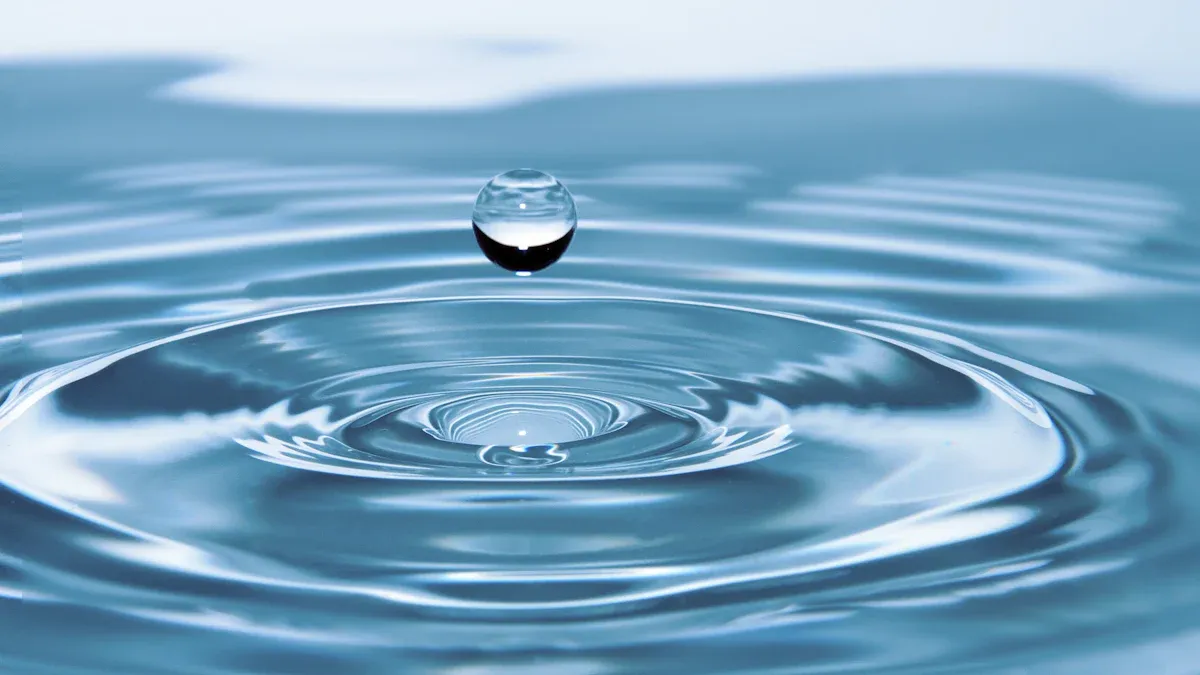
You may hear people talk about hard water and soft water. What makes them different? Hard water has a lot of minerals like calcium and magnesium. Soft water has fewer of these minerals. This difference affects the water in your house. Hard water can make soap scum. It can leave marks on sinks and tubs. It can also cause limescale to build up in machines. More than 80 countries have problems with hard water. Over 42 million homes use water softeners.
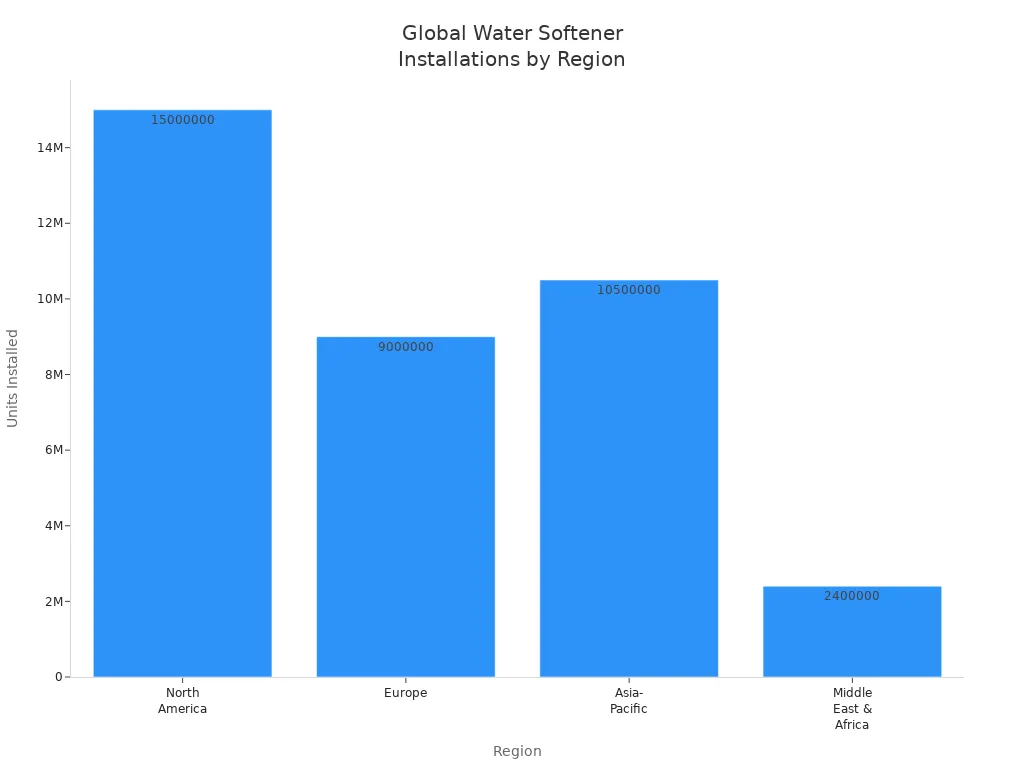
Picking the best water treatment helps protect your Water Purifier. It helps your machines last longer. It also makes your water better for everyday use.
Hard water has lots of minerals like calcium and magnesium. These minerals make scale and soap scum. Soft water has fewer minerals and feels smoother on your skin.
Hard water can hurt appliances and use more energy. It can also make cleaning cost more money. Soft water helps machines last longer and saves you money.
You can test your water at home or look at local reports. This helps you know if your water is hard or soft. It also helps you pick the right treatment.
Water softeners take out hardness minerals to protect pipes and machines. Filters clean out contaminants from water. Many homes use both for the best results.
Doing regular maintenance and using the right system keeps your water clean. It protects your appliances and saves you money over time.
Many homes around the world have hard water. Hard water has a lot of minerals, mostly calcium and magnesium. These minerals come from rocks and soil as water moves underground. Calcium carbonate, magnesium carbonate, and calcium sulfate are some minerals that make water hard. You might see white spots on dishes or scale in kettles if you have hard water. Hard water can also have iron, manganese, and zinc, but calcium and magnesium cause most of the trouble.
Here is a table that lists the main compounds in hard water:
Carbonate Hardness Compounds | Non-Carbonate Hardness Compounds |
|---|---|
Calcium carbonate (CaCO3) | Calcium sulfate (CaSO4) |
Magnesium carbonate (MgCO3) | Magnesium sulfate (MgSO4) |
Calcium bicarbonate [Ca(HCO3)2] | Calcium chloride (CaCl2) |
Magnesium bicarbonate [Mg(HCO3)2] | Magnesium chloride (MgCl2) |
Calcium hydroxide [Ca(OH)2] | |
Magnesium hydroxide [Mg(OH)2] |
Hard water minerals mix with soap and make scum. You might need more soap to wash clothes or dishes. Hard water can also leave scale in pipes and machines.
Soft water does not have much calcium or magnesium. You find soft water in places with volcanic rocks or not much limestone. Soft water does not leave spots or scale. If you use a water softener, your water may have more sodium. Soft water feels smooth and helps soap clean better. Many people like soft water for washing and bathing.
Feature | Soft Water | Hard Water |
|---|---|---|
Mineral Content | Low in calcium and magnesium | High in calcium and magnesium |
Calcium Level | Less than 60 mg/L (soft) | Above 121 mg/L (hard) |
Magnesium Level | Low | High |
Sodium Content | May be higher if softened | Typically low |
Hard water forms when water goes through rocks like limestone, dolomite, or gypsum. These rocks add calcium and magnesium to the water. The amount of hard water minerals depends on the rocks in your area. If you live where rocks are porous, you probably have hard water. Water that flows over volcanic rocks stays soft. The environment also matters. Carbon dioxide in soil helps minerals dissolve, making water hard. Temporary hardness comes from bicarbonates and goes away when you boil water. Permanent hardness comes from sulfates and chlorides and does not go away with boiling.
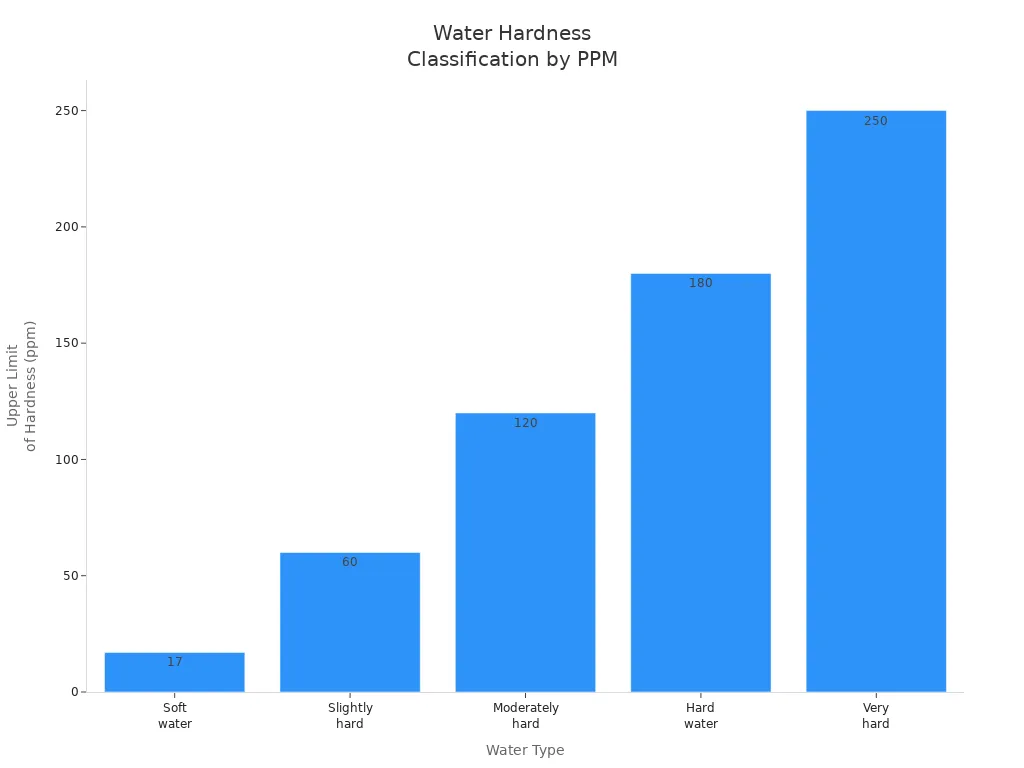
Tip: You can test your water at home to see if it is hard or soft. Many test kits show how much calcium and magnesium are in your water.
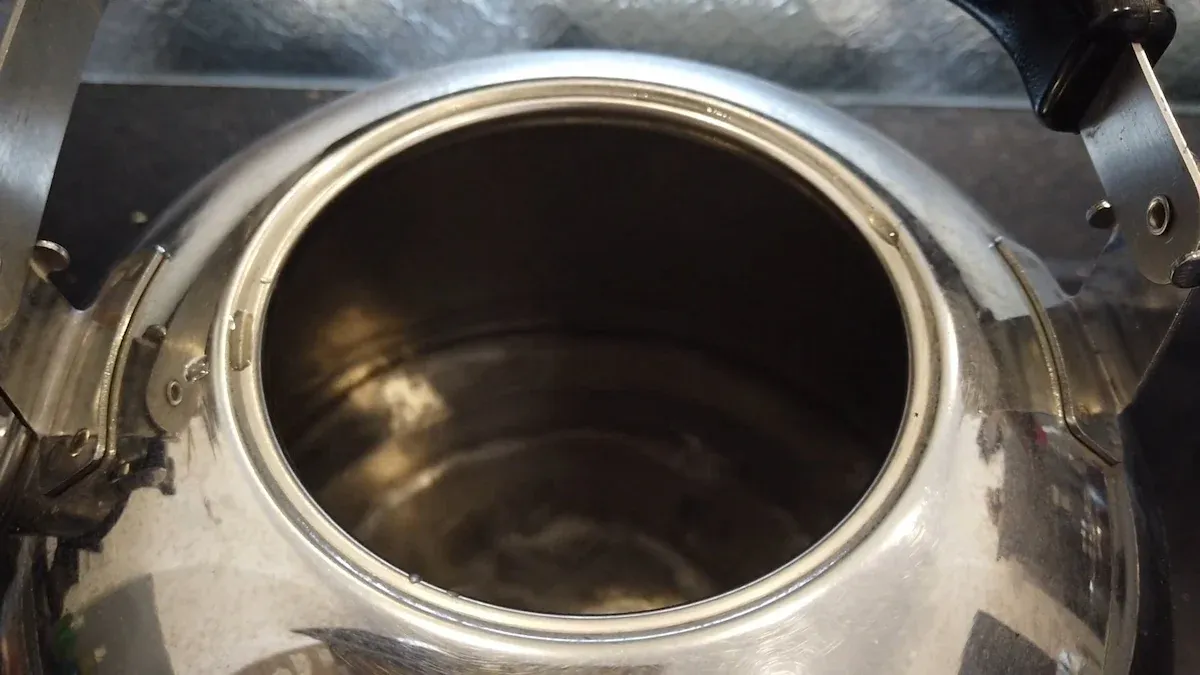
Hard water can cause trouble in your house. Minerals like calcium and magnesium collect inside machines. This buildup is called limescale. Limescale makes machines work harder. They use more energy. Studies show hard water can shorten appliance life by 30-50%. Heating parts may break early, sometimes after a few years. You might see white spots on dishes. You may notice soap scum in the bathroom. Hard water makes you use more detergent to clean things. This costs you more money. It can also hurt the environment.
Impact Aspect | Effect of Hard Water |
|---|---|
Energy use for heating water | 29% more energy consumed |
Additional water bill over 10 yrs | Approximately $1,500 more |
Appliance lifespan reduction | Decreased by 30-50% |
Increased annual detergent/soap costs | $1,039 more without softener |
Savings with water softener | 75-80% reduction in detergent/soap costs |
Tip: Some appliance warranties need soft water. Using hard water might cancel your warranty.
Soft water helps keep your home clean. It does not make limescale or soap scum. Soap makes bubbles easily, so you use less detergent. This saves you money. It also helps the environment. Soft water helps machines last longer. They work better too. Your water heater may last up to 15 years. You can save up to 29% on heating costs each year. You get cleaner clothes and dishes. Your skin and hair feel smoother.
Hard water has minerals like calcium and magnesium. These minerals help your body stay healthy. Some studies say drinking hard water may lower heart disease risk. This may be because of magnesium. Hard water can dry out your skin and hair. It can make eczema worse. Soft water has less calcium and magnesium. It has more sodium. If you have high blood pressure, you should watch your sodium from soft water. Most people can drink both types safely. Think about your health needs before choosing.
Taste is important too. Many people do not like how hard water tastes. In one survey, 95.6% of people did not like tap (hard) water taste. About 80% of people with a softener like the taste of soft water.
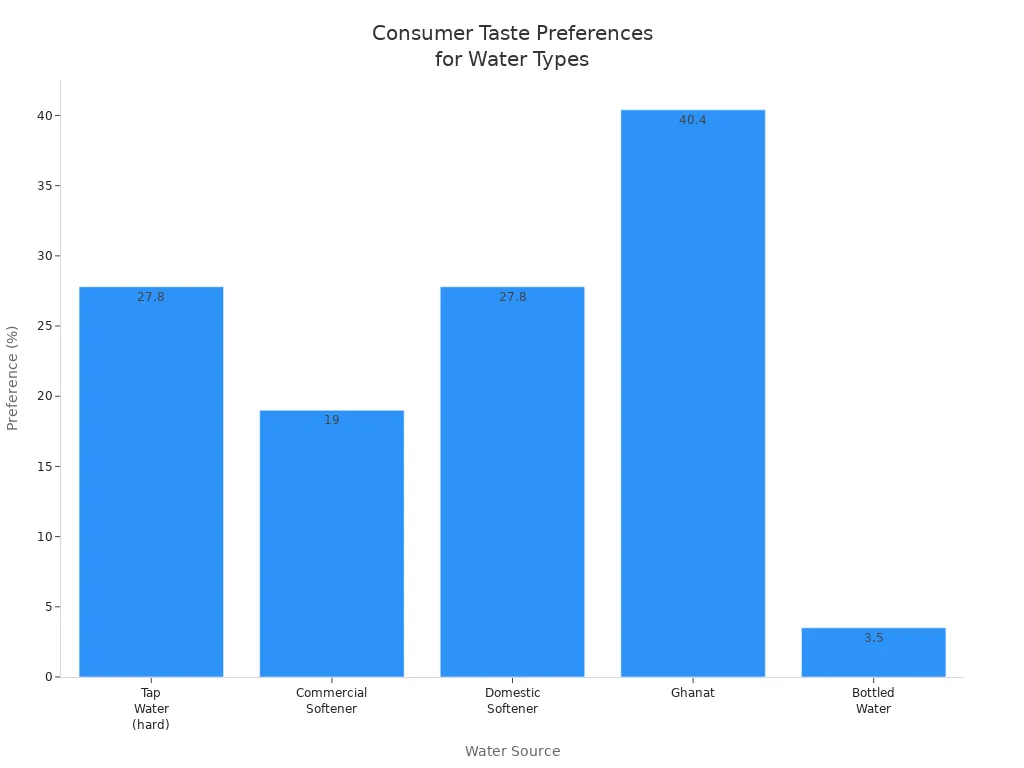
Note: Testing your water helps you pick the best choice for your home and health. Clean water helps your family stay healthy.
If you use hard water at home, your water purifier may have problems. Hard water has minerals like calcium and magnesium. These minerals can stick inside your water purifier and make scale. Scale blocks pipes and filters. This makes water flow slower. Your water purifier has to work harder. You might see white or chalky spots on heating parts or inside the purifier.
Research shows scale and minerals in pipes and purifiers cause many problems:
Water flow gets slower because scale blocks pipes and filters.
Blocked valves and filters make machines work worse.
Scale on heating parts makes heat move slower, so your purifier uses more energy.
Appliances break more often and do not last as long, so you pay more for repairs.
Tip: If your water purifier slows down or uses more energy, look for scale. Cleaning helps, but stopping hard minerals before they get in works best.
Hard water makes you spend more time and money on care. When minerals build up, you must clean or change filters more often. Dirty filters clog fast and stop working well. Mold can grow if you do not change filters on time. Minerals can block pipes and lower water pressure. Sometimes, you need a pro to fix drainage in reverse osmosis systems.
Here are the most common care problems with water purifiers in hard water places:
Filters get dirty and clog, so you clean or change them a lot.
Mold grows in wet filters, which can hurt your health.
Minerals block pipes, slow water, and raise pressure, which can break pipes.
Water quality changes may bring new germs, so you might need a pro to check.
Drainage problems in some systems make them work worse and may need a technician.
If you use soft water, you will have fewer care problems. Soft water does not make scale, so your purifier stays clean longer. You spend less time and money fixing things. Soft water helps your purifier work better and last longer. Salt-based softeners and other systems take out hard minerals, so your purifier runs well.
The water you use changes how long your purifier lasts. Hard water makes scale that hurts important parts inside your purifier. Calcium and magnesium make layers on heat parts. Your purifier works harder, uses more energy, and gets blocked. Over time, scale wears out seals, impellers, and tubes. This causes more breaks and a shorter life for your purifier.
Manufacturers and studies show using water softeners before your purifier helps. Softened water stops scale, so your purifier lasts longer. You will have fewer repairs, lower costs, and less downtime. Soft water helps your purifier work its best, saves energy, and keeps water quality steady.
Water Type | Scale Buildup | Maintenance Needs | Purifier Lifespan | Energy Use |
|---|---|---|---|---|
Hard Water | High | Frequent | Shorter | Higher |
Soft Water | Low | Less Frequent | Longer | Lower |
Note: If you want better water and to save money, use a water softener with your purifier. This keeps your purifier safe and your water good for your family.
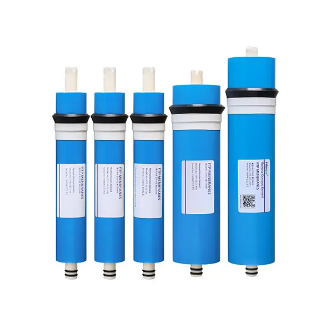
A water filter helps take bad stuff out of water. You can use a filter to make water taste better. It also helps water smell nicer and be safer. Most filters use activated carbon or other materials. These trap chemicals, chlorine, pesticides, and heavy metals. Some filters use KDF or catalytic carbon for more cleaning. A water filter does not take out hardness minerals like calcium and magnesium. If you want to fix hard water, a filter alone will not work. You can use a filter as part of a bigger system. This helps make sure your water is safe to drink.
Tip: Use a water filter to get rid of things that change taste and health, but remember it does not make water soft.
A water softener takes out hardness minerals from water. It uses ion exchange to swap calcium and magnesium for sodium or potassium. This stops scale from building up in pipes and machines. A water softener keeps your plumbing safe and helps soap work better. You will see fewer stains and less soap scum. A water softener does not take out things like chlorine, pesticides, or germs. If you want clean water, you may need both a softener and a filter. People often talk about water softeners vs filters, but each does a different job.
System Type | Removes Hardness Minerals | Remove Contaminants | Best Use |
|---|---|---|---|
Water Softener | Yes | No | Whole-home softening |
Water Filter | No | Yes | Drinking water cleaning |
A reverse osmosis system is a special kind of water filter. It uses a membrane to take out bad stuff. It can remove heavy metals, germs, and chemicals. A reverse osmosis system also takes out some hardness minerals. But it is not made to soften water for your whole house. Most people put a reverse osmosis system under the sink for drinking water. If you have hard water, use a softener before the reverse osmosis system. This keeps the membrane safe and gives you the best clean water.
Pick your water purification system based on your water problems. If you have hard water, a softener is best for removing hardness minerals. If you want to take out contaminants, use a filter or a reverse osmosis system. Many homes use both a softener and a filter. This gives you soft water for pipes and clean water for drinking. The filter vs softener choice depends on what you need. If your water has both hardness and contaminants, use both systems for full safety.
Note: Test your water before you choose. A pro test will show if you need a softener, a filter, or both. The right water purification keeps your water clean and your home safe.
You can start by testing your water at home. Many stores sell simple test kits. These kits help you check for hardness and other problems. Drop tests show how hard your water is. Each drop in the test means a certain level of hardness. You can also use strips that change color. If you want more details, look at your local water quality report. This report tells you about minerals, contaminants, and if your water meets safety rules.
Local water quality reports show what is in your water, like chemicals or germs.
These reports compare your water to safety standards.
You can see if your water has too much of something and if you need a special filter or treatment.
The report helps you pick the right system for your home.
Tip: Always check your water before buying a filter or softener.
After you know your water type, you can choose the best solution.
Test your water for hardness and write down the results.
Use the numbers to see if your water is soft, hard, or very hard.
If your water is hard, think about a water softener or conditioner.
Pick a system that matches your needs. Salt-based softeners remove minerals. Salt-free softeners change minerals so they do not stick.
Think about your family size and how much water you use. Bigger homes need larger systems.
If you want to clean all the water in your house, use a whole house water filter. This helps with both taste and safety.
Some homes use both a softener and a whole house water filter for the best results.
Your choice depends on your water, your health, and your budget. Reverse osmosis systems work well for drinking water but use more water. Always match the system to your needs.
You can keep your water system working well with regular care.
Clean faucets and showerheads with vinegar every week.
Deep clean appliances and check your filter every month.
Change your water filter as the maker suggests, usually every 6 to 12 months.
Flush your water heater once a year.
Have a pro check your water softener every year.
Use soft water to help your machines last longer and save energy.
Note: Good care stops scale, keeps your water safe, and saves money on repairs.
You can easily notice how hard and soft water are different:
Hard water has more calcium and magnesium. It makes scale in pipes and machines. This makes cleaning harder and machines work less well.
Soft water has fewer minerals. Soap makes more bubbles with it. Machines last longer, and it feels nicer on your skin and hair.
Both types are safe to drink, but soft water might have more sodium.
Test your water before picking a water purifier. This helps you choose the best system for your house. The right treatment keeps your machines safe and saves you money. Your local water and your family's health are most important.
Tip: Test your water before you buy a purifier or softener. The best choice depends on your water and what your family needs.
Hard water contains high levels of minerals, mainly calcium and magnesium. You may notice white spots on dishes or scale in appliances. These minerals come from rocks and soil as water moves underground.
You can use a test kit at home. Test strips or drop tests show the hardness level. Local water reports also tell you about mineral content. If you see scale or soap scum, your water is likely hard.
Yes, soft water often tastes smoother. Hard water may taste chalky or metallic because of minerals. Many people prefer the taste of soft water for drinking and cooking.
You can drink hard water safely. The minerals in hard water, like calcium and magnesium, help your body. If you have health concerns, test your water and talk to your doctor.
Top Benefits of Installing An Under Sink Water Purifier in Your Kitchen
Why Investing in A Water Purifier Is Essential for Your Health And Well-being
Top Benefits of Installing A Water Purifier for Your Kitchen Sink
Why Reverse Osmosis (RO) Water Purifiers Are A Game-Changer for Clean Water
Does a Hot and Cold Water Dispenser Use a Lot of Electricity?
What Is the Difference Between Hot and Cold Water Supply Systems?